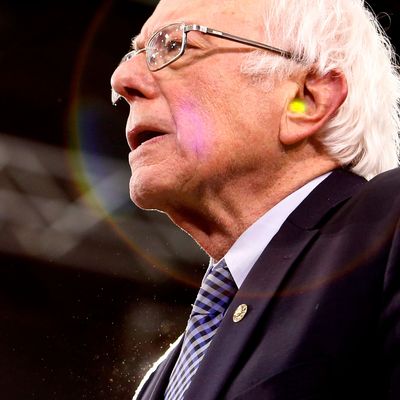
Democratic Party insiders have begun freaking out (justifiably, in my view) about the possibility Bernie Sanders will head the ticket. “Unless another Democrat rapidly consolidates support,” the New York Times notes, “Mr. Sanders could continue to win primaries and caucuses without broadening his political appeal, purely on the strength of his rock-solid base on the left — a prospect that alarms Democratic Party leaders who view Mr. Sanders and his slogan of democratic socialism as wildly risky bets in a general election.”
You’ve probably heard this before, and you probably think you know how it ends. Republicans were equally terrified of nominating Trump in 2016 (who, despite all his liabilities, wound up squeaking out an improbable win, with assists from the Electoral College, the FBI, and Russian intelligence). Yet his rivals attacked each other in a bid to be the last non-Trump standing, and the party failed to organize an effective and unified opposition. Trump prevailed and showed just how hapless the party is.
That same strategy may work for Sanders. But what if it doesn’t? What if the party … decides?
If that phrase sounds vaguely familiar, allow me to refresh your memory. Four years ago, The Party Decides was the fashionable book for the cognoscenti. Its thesis held that party networks had ways of influencing primaries to ensure their preferred nominee won.
What gave the book special appeal was how closely it predicted the 2012 Republican primary, the only contested race of that year. A series of bombastic right-wing populists emerged and captured the imagination of the voters, but all collapsed, as if dragged down by an invisible force, as uninspiring elite fave Mitt Romney prevailed. The Party Decides was a pithy name for that invisible force.
Of course, that thesis turned out to be the worst possible guide for understanding the 2016 Republican primary. As Trump made a mockery of the party’s power, the book went from Rosetta stone to punch line.
Clearly, The Party Decides should not be taken as an iron law of history. Indeed, its authors proceeded to conclude that recent changes to the system “have made it easier for factional candidates and outsiders to challenge elite control of nominations.” At the same time, we should consider the possibility that the party’s power, while less absolute than we thought before Trump, is not negligible.
One reason to think this is the case is that a lesson from the Republican Party can’t always be faithfully imported to the Democratic Party. The parties are different from each other (as we have learned from the political-science research about asymmetric polarization, which has held up). The Republican-aligned media has spent years lambasting its leaders as feckless losers. The conservative base has goaded its leaders into a series of crusades that leaders knew to be counterproductive, but were afraid to stand in the way of, for fear of being called sellouts. Intermittent government shutdowns and endless chasing of birther and Benghazi conspiracies were all precursors of the dynamic that produced Trump.
Democrats have almost none of that. Most Democratic voters, unlike most Republican ones, want their party to be more moderate, not less, and believe in compromise over confrontation. The Democratic Party elite is much less afraid of being seen as squishy than the Republican elite.
Second, we’re seeing some of the anti-Sanders coordination in action right now. In the Nevada primary, the Las Vegas Sun endorsement is a plea not to support Sanders, and the powerful Culinary Workers Union is denouncing his Medicare for All plan. Democrats from vulnerable districts are making increasingly public pleas to the same effect. “One House Democrat said colleagues from swing districts are scared by the prospects of a Sanders nomination, while another said moderates are increasingly concerned that a Sanders candidacy would devastate their prospects for winning the White House and retaining the House,” reports the Associated Press. All these efforts could easily fail, but they are probably not completely ineffectual.
A third reason is a very simple one. People often assume the thing that happened most recently will keep happening. Analysts (including me) dismissed Trump’s chances in 2016 because we overlearned the lesson of 2012. Maybe we’re overestimating Bernie’s populist insurgency in 2020 because we’re overlearning the lesson of 2016. Instead of moving the Party Decides slider from 100 to 0, perhaps we should have set it somewhere in between.
Nobody can be sure how the primary will go. A Democratic version of Trump’s long, slow bludgeoning of the party elite is certainly one very possible outcome. It is not destiny.






























